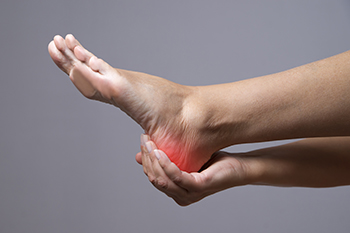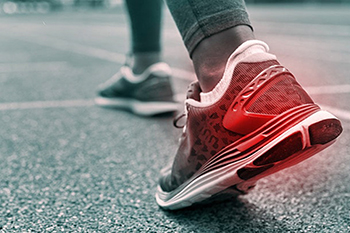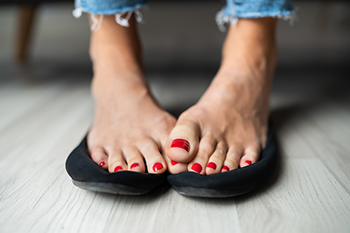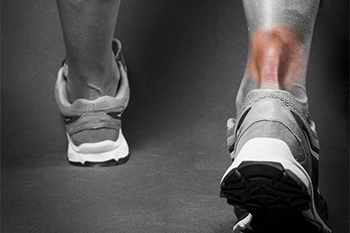Freehold (732) 294-9393
Freehold (732) 294-9393

Heel pad syndrome occurs when the protective fat pad beneath the heel thins or loses its elasticity, reducing the ability to absorb impact. This can result in deep, aching pain at the center of the heel, particularly when walking, standing, or engaging in high-impact activities. Some people describe a bruised sensation, which may worsen when walking barefoot or on hard surfaces. Repetitive stress, prolonged standing, excess body weight, and aging can contribute to the deterioration of the heel pad. Wearing inappropriate footwear and conditions that affect soft tissue integrity, such as diabetes or arthritis, may also play a role in developing heel pad syndrome. A podiatrist can evaluate the condition by examining your heel and assessing fat pad thickness. Diagnostic imaging may be used to differentiate heel pad syndrome from other sources of heel pain, like plantar fasciitis or stress fractures. Treatment options for heel pad syndrome include footwear modifications, custom orthotics, or cushioning inserts to support the heel and reduce discomfort. If you are experiencing pain on the bottom of the heel, it is suggested that you schedule an appointment with a podiatrist for a diagnosis and treatment options.
Many people suffer from bouts of heel pain. For more information, contact Dr. Henry Miller of New Jersey. Our doctor can provide the care you need to keep you pain-free and on your feet.
Causes of Heel Pain
Heel pain is often associated with plantar fasciitis. The plantar fascia is a band of tissues that extends along the bottom of the foot. A rip or tear in this ligament can cause inflammation of the tissue.
Achilles tendonitis is another cause of heel pain. Inflammation of the Achilles tendon will cause pain from fractures and muscle tearing. Lack of flexibility is also another symptom.
Heel spurs are another cause of pain. When the tissues of the plantar fascia undergo a great deal of stress, it can lead to ligament separation from the heel bone, causing heel spurs.
Why Might Heel Pain Occur?
Treatments
Heel pain should be treated as soon as possible for immediate results. Keeping your feet in a stress-free environment will help. If you suffer from Achilles tendonitis or plantar fasciitis, applying ice will reduce the swelling. Stretching before an exercise like running will help the muscles. Using all these tips will help make heel pain a condition of the past.
If you have any questions please contact our office located in Freehold, NJ . We offer the newest diagnostic and treatment technologies for all your foot and ankle needs.

When selecting running shoes, both men and women should consider their specific needs, such as the type of running they do and their foot structure. For those who run on roads or hard surfaces, cushioned running shoes are ideal as they provide ample shock absorption. Trail runners, on the other hand, benefit from shoes with more grip and durability, designed to handle uneven terrain. Stability shoes are great for individuals with mild overpronation, offering support to keep the foot aligned while running. Neutral shoes are suited for runners with a natural gait, offering flexibility and comfort. For both men and women, finding the right fit is essential, as wearing improper shoes can lead to discomfort or injury. Factors like arch height, foot shape, and running style should guide the decision. If you have endured a foot injury from running, it is suggested that you consult a podiatrist who can offer effective relief and treatment tips, and guide you the right type of running shoes to wear.
You should always make sure your running shoes fit properly in order to avoid injury. For more information, contact Dr. Henry Miller from New Jersey. Our doctor can provide the care you need to keep you pain-free and on your feet.
Choosing the Right Running Shoe for Your Foot Type
Improper shoe sizing can cause a myriad of problems for your feet. Shoes that don’t fit you properly can lead to muscular imbalances in your body, which can result in foot, knee, and hip injuries.
Tips for Finding the Right Running Shoe
If you have any questions please feel free to contact our our office located in Freehold, NJ . We offer the newest diagnostic and treatment technologies for all your foot and ankle needs.

Hyperhidrosis of the feet, or plantar hyperhidrosis, is a condition characterized by excessive sweating, often unrelated to temperature or activity. This persistent moisture can lead to discomfort, foot odor, and an increased risk of fungal infections, such as athlete's foot. It may also cause skin softening, making the feet prone to blisters and sores. Living with hyperhidrosis can significantly impact the quality of life. People may feel self-conscious about the condition, avoiding activities like removing shoes in public or wearing open-toed footwear. The constant dampness can also compromise shoe longevity and lead to slipping or reduced stability during physical activities. Treatments include antiperspirants, oral medications, and more innovative techniques to reduce sweat production. If hyperhidrosis is affecting your daily life, it is suggested that you see a podiatrist to explore effective solutions and regain confidence.
If you are suffering from hyperhidrosis contact Dr. Henry Miller of New Jersey. Our doctor can provide the care you need to attend to all of your foot and ankle needs.
Hyperhidrosis of the Feet
Hyperhidrosis is a rare disorder that can cause people to have excessive sweating of their feet. This can usually occur all on its own without rigorous activity involved. People who suffer from hyperhidrosis may also experience sweaty palms.
Although it is said that sweating is a healthy process meant to cool down the body temperature and to maintain a proper internal temperature, hyperhidrosis may prove to be a huge hindrance on a person’s everyday life.
Plantar hyperhidrosis is considered to be the main form of hyperhidrosis. Secondary hyperhidrosis can refer to sweating that occurs in areas other than the feet or hands and armpits. Often this may be a sign of it being related to another medical condition such as menopause, hyperthyroidism and even Parkinson’s disease.
In order to alleviate this condition, it is important to see your doctor so that they may prescribe the necessary medications so that you can begin to live a normal life again. If this is left untreated, it is said that it will persist throughout an individual’s life.
A last resort approach would be surgery, but it is best to speak with your doctor to find out what may be the best treatment for you.
If you have any questions please feel free to contact our office located in Freehold, NJ . We offer the newest diagnostic and treatment technologies for all your foot and ankle needs.

An Achilles tendon rupture is a serious injury that severely affects mobility. Treatment options include surgical repair or immobilization. Achilles tendon surgery reattaches the torn ends of the tendon and can be performed as an open procedure, which involves a larger incision, or as a percutaneous procedure. Percutaneous procedures use small punctures in the skin to insert tools for repairing the tendon, offering a less invasive approach that may result in reduced scarring and faster recovery. Surgery is often recommended for younger or more active patients because it lowers the risk of another rupture. Immobilization uses devices like casts, splints, or walking boots to keep the lower leg and ankle stationary while the tendon heals naturally. This method is commonly chosen for older or less active patients due to fewer associated risks. A podiatrist can assess your Achilles tendon injury and determine the best treatment based on the extent of the rupture and your activity level. If you have torn your Achilles tendon, it is suggested that you schedule an appointment with a podiatrist for an exam and suggested treatment options.
Achilles tendon injuries need immediate attention to avoid future complications. If you have any concerns, contact Dr. Henry Miller of New Jersey. Our doctor can provide the care you need to keep you pain-free and on your feet.
What Is the Achilles Tendon?
The Achilles tendon is a tendon that connects the lower leg muscles and calf to the heel of the foot. It is the strongest tendon in the human body and is essential for making movement possible. Because this tendon is such an integral part of the body, any injuries to it can create immense difficulties and should immediately be presented to a doctor.
What Are the Symptoms of an Achilles Tendon Injury?
There are various types of injuries that can affect the Achilles tendon. The two most common injuries are Achilles tendinitis and ruptures of the tendon.
Achilles Tendinitis Symptoms
Rupture Symptoms
Treatment and Prevention
Achilles tendon injuries are diagnosed by a thorough physical evaluation, which can include an MRI. Treatment involves rest, physical therapy, and in some cases, surgery. However, various preventative measures can be taken to avoid these injuries, such as:
If you have any questions please feel free to contact our office located in Freehold, NJ . We offer the newest diagnostic tools and technology to treat your foot and ankle needs.